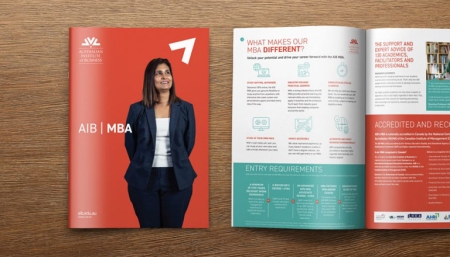Five career benefits of an MBA in finance

According to the National Industry and Skills Committee, the finance industry in Australia employed over 490,000 people in 2021. This number is excepted to rise to 518,800 by 2025. Needless to say, Australia’s finance sector is booming – and now is the perfect time to jump on board.
At the Australian Institute of Business (AIB), we offer a Fast-Track MBA that specialises in finance. This program teaches students imperative skills to increase their knowledge of finance and improve their personal growth – creating a pathway to professional and personal success within the finance community.
So why should you consider an MBA in finance, and what can it lead to? Read on to discover the top five career benefits of an MBA in finance.
Why you should specialise your MBA?
At AIB, we offer two kinds of MBAs – general and specialised. General MBAs are an excellent option for those looking to broaden their horizons, enhance their skill set or transition out of a niche industry.
While specialised MBAs – like finance – allow you to become a financial specialist in your field and boost your career in the financial industry. You’ll also gain knowledge of theoretical frameworks and data-driven techniques relevant to modern private sector companies, the public sector, and not-for-profit organisations.
Stand out from other people in your field
Niching down and specialising in one area not only makes you an expert in your industry, but it’s also more likely to turn you into a more attractive prospect for potential employees. This gives you the opportunity to add more value in that area, earning you attractive roles with higher pay.
And as an added bonus, being a specialist in a particular area means less competition when it comes to finding employment.
Offer employees targeted expertise
It can take years to refine your knowledge across a wide range of broad disciplines. However, if your goal is to be seen as a thought leader in a particular field, our Fast-Track MBA allows you to effectively level up with a specific course content tailored to that niche. In fact, eligible students who concurrently study can complete their MBA in as little as 12 months. This allows you to differentiate yourself from others and increase your authority.
Jason studied the Fast-Track MBA to get a broader business understanding within his company and is now well-positioned to take the next step in his career.
“Now that I’ve completed the MBA I feel a lot more confident in my current role, and I’m also looking to apply what I’ve learnt to my work to gain experience for my next role in my career – not only just the theories and the framework but just the rigour in having to do that sort of study and planning and the like, I think has been invaluable.”
Read Jason’s full story and testimonial .
What are the benefits of an MBA in finance and accounting?
Higher earning potential
Acquiring an MBA gives you more skills that can benefit a business. This in itself could warrant a request for an increased salary. The more you can offer your employer, the more you can expect to get in return.
*According to Talent.com, a finance manager in Australia can earn up to $127,500
per annum. A chief financial officer could earn up to $154,183 per annum. And a senior financial analyst could earn up to $116,741 per annum.
*These are just guidelines and cannot be promised on behalf of your employer.
Opens up opportunities for a new role or job
Gaining new skills in your MBA could create an opportunity for a promotion at your current place of work or a new one.
What roles can I apply for with an MBA in finance?
If you’re currently an accountant, you may be able to become a financial analyst or financial advisor. Either way, your MBA in finance will help advance your career. Other job titles you may be eligible to apply for are:
- Commercial finance manager
- Corporate services manager
- Executive finance manager
- Finance consultant
- Finance director
- Finance manager
- Group finance manager
- Project finance partner
- Regional finance manager
Improves business relationships within the finance community
An MBA in finance includes subjects in business strategy and development. The soft skills learned in these subjects will allow you to enhance relationships with your internal and external stakeholders.
This is because our MBA in finance not only teaches you the skills needed to become a finance expert, but also a range of soft skills that will accelerate your career in finance:
- Critical thinking: The ability to review or observe all facts, evidence and history and make informed decisions based on those observations.
- Problem-solving: Finding solutions to complex problems that drive a business forward.
- Communication: An effective communicator can build trust with employees and customers, improve team engagement and productivity and resolve issues effectively.
- Research and analysis: The ability to gather, analyse and interpret data to make informed decisions.
- Lateral thinking: The ability to think creatively as a way to innovate and generate new products, services or ideas that aid business growth.
Studying an MBA in finance also gives you access to a strong professional network that could last the entirety of your career. After all, the old saying of “it’s who you know” has never been more important in finance.
Empowers you to become a leader in the finance industry
Our MBA in finance teaches skills that turn our students into great leaders. Skills like empathy, listening, creativity and strategic thinking are all folded into the course to develop exceptional leaders within the finance industry.
By exposing you to a broad range of business theories, our MBA in finance broadens your business vocabulary and increases your confidence in verbal and written communication. The MBA also includes multiple case studies, group discussions, presentations and projects – instilling the importance of teamwork. And numerous webinars and assignments will sharpen your critical thinking and problem-solving skills. All these traits make for a successful financial leader.
And for those who already own a business – you’re in luck. Students are also encouraged to use their own company where possible as a case study. That way, they can get practical learning from their studies almost instantly.
Builds trust and engages fellow employees
Knowledge helps build trust – not just with your clients, but with your fellow colleagues and senior management. By developing your business, finance and leadership skills, you’ll organically build trust with the people in your organisation. Healthy trust among the team can lead to better staff engagement and ultimately better outcomes for the organisation.
Learn more: How hiring an MBA graduate can boost your company’s ROI
What subjects will I study?
Your core subjects include:
- Leadership (First Subject)
- Marketing Management (Second Subject)
- Operations Management
- Strategic Human Resource Management
- Corporate Governance
- Financial Management
- Project Management
- Strategic Management
Specialisation subjects include:
- Corporate Finance – Using the same integrated framework and analytical tools experienced leaders use, students are taught how to make financial decisions that improve their company’s value.
- Financial Markets and Institutions – Students will develop an in-depth understanding of complex institutions, monetary systems, financial regulators and more.
- Investment Management – Students will gain comprehensive practical knowledge of investment management plus a theoretical understanding of macroeconomic and industry analysis, main financial derivatives pricing, and portfolio performance evaluation.
Delivered online with continual updates, innovations and new releases, the Fast-Track MBA offers genuine flexibility, industry insights, practical skills and the support you need to achieve your goals in our fast-changing world. It’s created for people just like you. Learn more about our Master of Business Administration (Finance).



